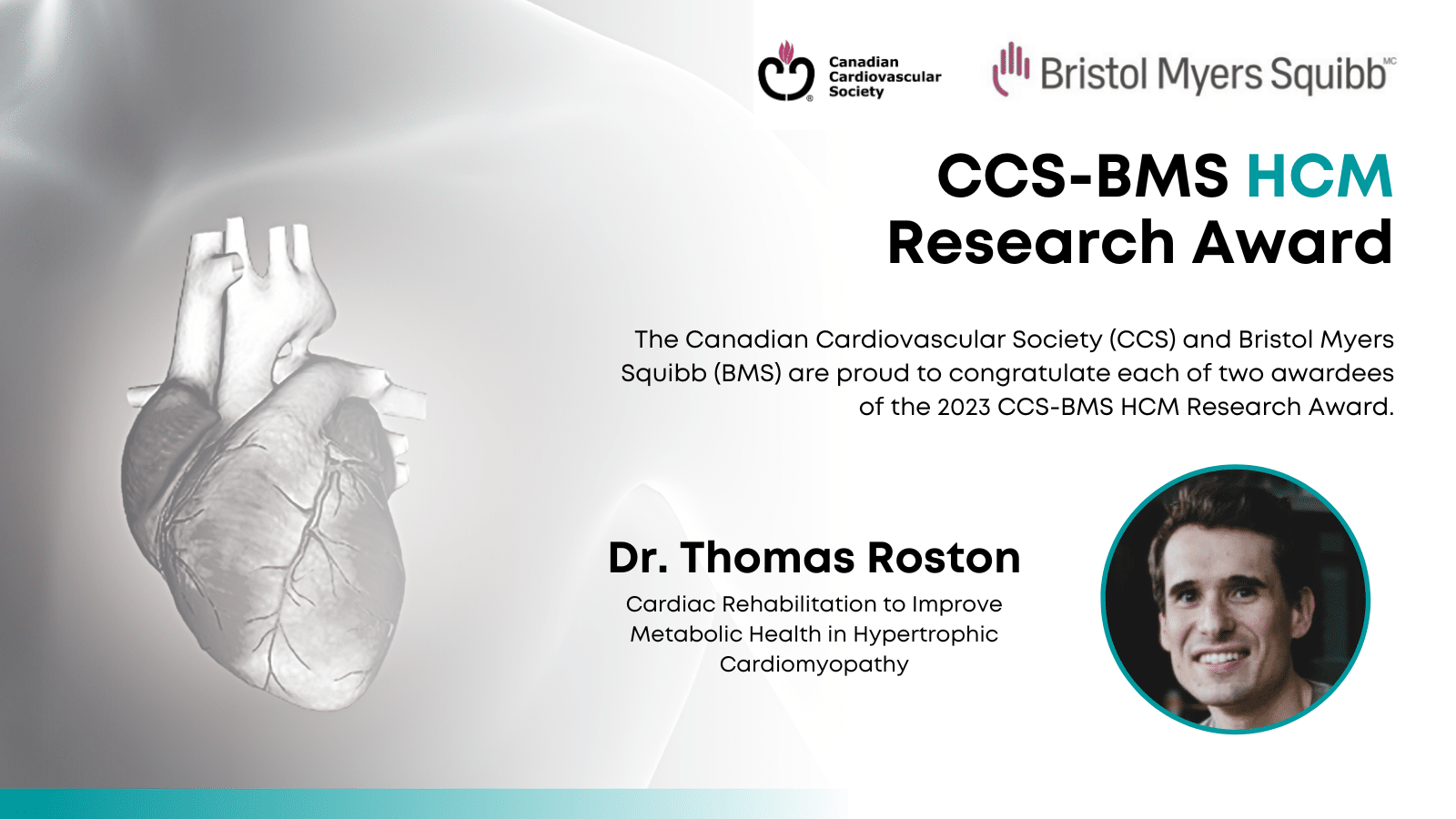
Research probes benefits of exercise interventions for people with common inherited heart disease
Dr. Thomas Roston, a cardiologist and clinician-scientist at St. Paul’s Hospital and Vancouver General Hospital, is the winner of the CCS-BMS HCM Research Award for his research project Cardiac Rehabilitation to Improve Metabolic Health in Hypertrophic Cardiomyopathy. Dr. Roston received a MD from the University of British Columbia before completing residencies in internal medicine and cardiology, and a PhD from the University of Alberta focused on inherited heart disease. He has additional fellowship training from Harvard Medical School in cardiovascular genetics, and from the University of Alberta in cardiac critical care.
Here, we chat with Dr. Roston about his research program to learn how it will potentially change treatment for people living with the most common inherited heart disease, hypertrophic cardiomyopathy (HCM), which affects about one in 400 Canadians. HCM is a condition that leads to abnormally thick heart muscle that can obstruct blood flow out of the heart, and lead to dangerous rhythm disturbances.
Q: Dr. Roston, what attracted you to this area of research?
A: Unlike most cardiac conditions, inherited heart disease disproportionately affects young people who are in the prime years of their lives. While there is an important focus on the development of new medications, I am particularly interested in research on simple, low cost interventions, such as exercise, to improve cardiometabolic health and reduce the severity of HCM. This marks a substantial change in the field, as exercise was once felt to increase the risk of complications from HCM, partly because of highly publicized incidents of sudden cardiac death during competitive sports. Recent data show us that this is not actually the case — sudden death in the young can equally occur during normal activities, but such tragedies are probably less publicized. In other words, young people may have been unnecessarily restricted from athletics due to HCM, and we want to shift the paradigm going forward by prescribing exercise as treatment.
Q: How did this project get started?
A: The impetus for the project was the increasing research in the field of HCM that suggests people who have the condition often develop other cardiac risk factors, such as high blood pressure, diabetes, and obesity. In these situations, the overall cardiac prognosis is probably poorer. So, finding ways to reverse traditional cardiac risk factors and introduce exercise, may improve HCM outcomes. Even more, we are excited about the improved quality of life that can stem from regular participation in aerobic exercise.
Q: Can you walk us through what your project entails?
A: It entails enrolling 20 to 25 patients with HCM and traditional metabolic and cardiac risk factors in a three-month supervised exercise program called cardiac rehabilitation. We will evaluate if the program is well tolerated and improves their markers of cardiometabolic risk immediately following the program and then several months after program completion. We will give participants wearable accelerometers (FitBit watches) to follow their heart rates to determine if their aerobic exercise patterns are maintained even after the cardiac rehab program is finished.
Q: What knowledge gap will this fill?
A: We hope that it will continue to push the pendulum towards the acceptance of exercise as a safe and potentially beneficial intervention in people with HCM. If true, this finding will probably expand the referral criteria for cardiac rehabilitation programs to include patients with HCM. This is important because, at present, HCM is not considered an indication for cardiac rehab enrolment in most provinces. If the data from our study appear to be promising, we are going to try to do a national multicentre study probing the same question over a longer period of time in a larger cohort of patients.
Q: What does this fellowship award mean to you, personally?
A: I am early career and this is my first national-level, peer-reviewed grant as a principal investigator. I am hoping it will be the catalyst for the growth of my research program. From a broader perspective, it is important to realize that Canada has been producing more and more valuable HCM research in recent years, and this award further enables Canadian growth on an international level.
Q: Tell us about your research team.
A: Our team already participates in the Hearts in Rhythm “HiRO” HCM Registry based out of the Montreal Heart Institute. This award will enable the local growth of a HCM focused team at UBC, with the support of the UBC Division of Cardiology and Centre for Cardiovascular Innovation (an innovation hub). With our very large provincial HCM Clinic and cardiac rehabilitation programs, Vancouver is becoming a prime place to conduct HCM studies and we hope this generous award will be a step towards further opportunities and successes for our institution.
Other News
See AllHeart Month: Celebrating Canadian Cardiovascular Research
February 1, 2024
This Heart Month, we’re focusing on the importance of fostering growth of peer-reviewed Canadian...
Heart Month Research Fellowships & AwardsGuided Ultrasound Study Aims to Deliver Therapy to Reverse Common Genetic Heart Disease
November 17, 2023
Dr. Brandon Helfield, an Assistant Professor at Concordia University in Montreal, is the winner of a...
HCM Research Fellowships & AwardsBiomarker Study Seeks to Understand How Location and Type of Body Fat is Linked to Cognitive Decline
November 16, 2023
Clinician-scientist Dr. Marie Pigeyre is the winner of the CCS Cardiometabolic Research Award for...
Cardiometabolic Research Fellowships & Awards